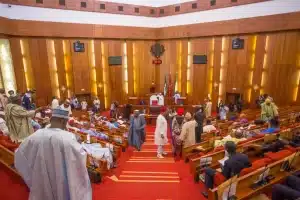E
Enioluwa Adeniyi
Guest

There is a stalemate and confusion in the Nigerian Senate regarding the feasibility of implementing the Financial Autonomy granted to the 774 Local Government Councils by the Supreme Court earlier this year.
The trouble began on Wednesday when Senator Tony Nwoye of the Labour Party, representing Anambra North, raised a Point of Order after the sixth item on the agenda concerning petitions was addressed.
Senator Nwoye, invoking orders 41 and 51 of the Senate Standing Rules, moved a motion concerning alleged attempts by some state governments to bypass the Supreme Court ruling on Local Government (LG) autonomy through counter-laws enacted by their respective State Houses of Assembly.
As he spoke, confusion erupted in the chamber, particularly when Nwoye revealed that nine other senators had co-sponsored the motion.
He specifically accused certain state governors of enacting laws mandating local government councils in their states to deposit funds into State/Local Government Joint Accounts, a practice ruled unconstitutional by the Supreme Court.
Upon concluding his presentation, which included six prayers for the enforcement of the judgment, Senator Osita Izunaso from Imo West seconded the motion.
However, Adamu Aliero, a senator from Kebbi Central representing the People’s Democratic Party (PDP), quickly raised a constitutional point of order to halt the debate on the motion.
Senator Aliero cited Section 287 of the 1999 Constitution, which states that Supreme Court judgments are enforceable across the nation.
He urged his colleagues not to prolong the discussion, asserting that there was no need to debate an issue already settled by the Supreme Court.
In support of Aliero’s assertion, Senate President Godswill Akpabio raised another constitutional concern, directing attention to Section 162, Sub-section 6 of the 1999 Constitution.
This section, he noted, established the State/Local Government Joint Account, which would require amendment to fully implement the Supreme Court judgment.
Akpabio said, “I think what we need to do is to carry out required amendments of certain provisions of the constitution as far as local governments autonomy is concerned.”
But before taking a final decision on the motion, the sponsor, Senator Nwoye hurriedly raised order 42 of the Senate Standing rules for personal explanation on the motion the same time, Senator Abdulrahman Summaila Kawu, NNPP Kano South raised a similar point of order.
The simultaneous points of Order brought confusion into the session with many senators rushing to the Senate President for a personal consultation, which eventually, made the Senate go to an emergency closed-door session at exactly 12: 46. pm.
Recall that the Supreme Court had in early August this year, barred the 36 governors of the federation from further retaining or utilizing funds that are meant for the 774 Local Government Areas, LGAs, in the country.
The apex court ruled that it was illegal and unconstitutional for governors to continue to receive and seize funds allocated to LGAs in their states.
The Supreme Court had maintained that the “dubious practice” which has gone on for over two decades, was a clear violation of Section 162 of the 1999 Constitution, as amended.
In its lead judgement that was delivered by Justice Emmanuel Agim, the apex court held that no House of Assembly of any state has the power to make laws that could, in any manner, interfere with monies meant for the LGAs.
Stressing that the law mandated that LGAs must be governed by democratically elected officials, the Supreme Court ordered that forthwith, funds meant for the LGAs must be directly paid to them from the federation account.
The Supreme Court said, “Demands of justice require a progressive interpretation of the law. It is the position of this court that the federation can pay LGA allocations to the LGAs directly or pay them through the states.
“In this case, since paying them through states has not worked, justice of this case demands that LGA allocations from the federation account should henceforth be paid directly to the LGAs.”
It further declared unconstitutional the appointment of caretaker committees by governors to run the affairs of the LGAs. It held that the 36 states are under obligation to ensure democratic governance at the third tier of government.
The judgement was a sequel to a suit the Federal Government filed to secure financial autonomy for the LGAs.
The post Breaking: Confusion As Senate Enters Emergency Closed-Door Session Over LG Autonomy appeared first on Naija News.
